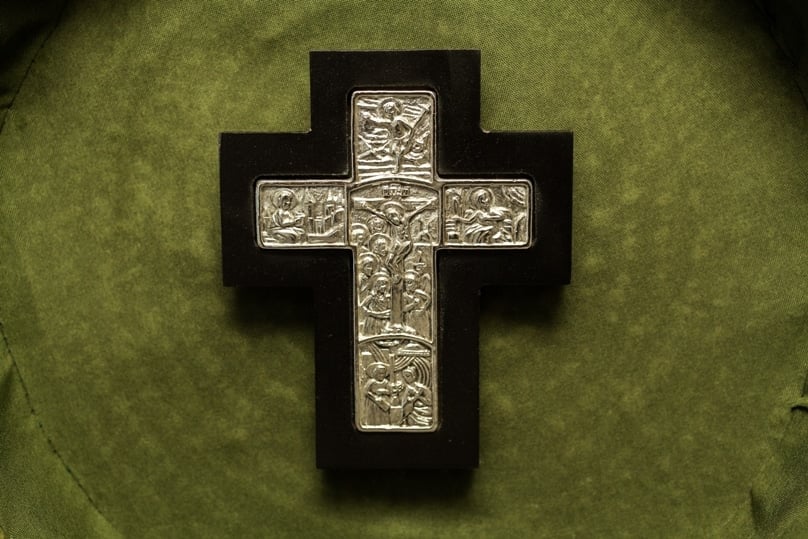
Ghanaian Cardinal Peter Turkson, a Vatican official, told participants at an interfaith dialogue in Santa Clara that “Pope Francis” is “not just a name, it’s a program”.
In opening remarks, he shared an anecdote about the pope’s decision to choose the name “Francis” out of his concern for the poor.
The name is a “program of the pontificate, program of action and program of life”, said the cardinal, who is president of the Pontifical Council for Justice and Peace and the lead consultant on Pope Francis’ encyclical on the environment.
Cardinal Turkson gave some background on Laudato Si’ and its roots in a hymn by St Francis of Assisi called the Canticle of the Sun, also known as the Canticle of Creatures. He described the document as requiring a “prayerful contemplation of the universe”, but also appealing to science in regard to global warming, climate change and abusive treatment of the earth.
“The concern of the encyclical is precisely that. That having received the earth as a garden, we don’t pass it on as a wilderness or a desert,” he said.
The 3 November dialogue was part of a two-day conference titled “Our Future on a Shared Planet: Silicon Valley in Conversation With the Environmental Teachings of Pope Francis” that took place on the campus of Jesuit-run Santa Clara University.
The faith leaders in attendance included representatives of the Muslim, Jewish and Buddhist traditions.
Also at the event were 70 religious and community leaders from various parts of the Silicon Valley as well as university leaders, Jesuit Fr Michael Engh, president.
The event began with members of the university’s student interfaith council offering a blessing before vegan salads were served to attendees. After lunch, guests seated at 10-person tables engaged in conversation and discussion.
Theresa Ladrigan-Whelpley, director of Bannan Institutes in the university’s Ignatian Center for Jesuit Education, introduced Cardinal Turkson. The prelate was on a panel with Rabbi Allan Berkowitz, executive director of Environmental Volunteers; Eijun Linda Cutts of the San Francisco Zen Center; and Ameena Jandali, a founding member and the content director of the Islamic Network Group.
The panel moderator was the Rev. Sally G. Bigham, an Episcopal priest who is president and founder of Interfaith Power and Light. She is canon for the environment in the Episcopal Diocese of California.
She asked each panelist to briefly reflect on a personal experience in nature that connected to their respective religious tradition, encouraging them to share how the two interact.
The speakers drew on their respective holy texts: Rabbi Berkowitz cited the Torah as well as the Rabbinic Letter on the Climate Crisis, issued Oct. 29 and signed by 425 rabbis. Jandali read passages from the Quran, and Cutts shared teachings from the Dalai Lama.
They commented on their respective faiths’ principles of social justice, caring for the poor, the interdependence of mankind and nature and the pope’s call for dialogue on how mankind is acting and behaving in regard to the environment.
Rev. Bingham asked Cardinal Turkson about the timing of the release of Laudato Si’ and the recent papal visit to Washington, wondering whether the two events were planned in relation to each other.
While in the nation’s capital, the pope delivered an address to a joint meeting of Congress in which he urged the lawmakers to act on a number of issues, including climate change.
The cardinal detailed the encyclical’s timeline – it was issued in this past June but the drafting of it began more than a year ago – but he did not explicitly say that document’s release and the visit to Congress were connected.
In closing remarks, Cardinal Turkson stressed that the encyclical is not just a document for scientists and scholars.
“Everybody can do something toward this. … In dealing with this (the environment), one should not think that religion has no contribution to make,” he said.
A brief question-and-answer session followed. Attendees asked the panellists to comment on the current so-called “waste age”, the Catholic idea of dominion, the influence of technology in caring for the environment and the role that war plays in climate change.
Attendees Marianna Grossman, the chief sustainability officer at Sustainable Silicon Valley, said in an interview that she heard certain commonalities in the perspectives of the faith leaders.
“I saw the connections to the teachings of peace, care for creation and the importance of interfaith dialogue and collaboration. It will take all of us working together -– believers and nonbelievers, men and women, young and old – to build a future together that repairs the damage we have done to the earth and to one another and to strengthen our resilience to weather the consequences of climate change that we have already set into motion,” Grossman said.
Jesuit Fr Thomas Massaro, dean of Santa Clara University’s Jesuit School of Theology in Berkeley, said that unlike speakers at other panels he has heard, these panellists were in agreement that urgent change is needed. He added that Laudato Si’ is really unlike any other encyclicals.
“It’s addressed to all people of good will and intended for people of other faiths to really make good use of it,” he said. “More than any other encyclical, this is the one that is for everybody.”
